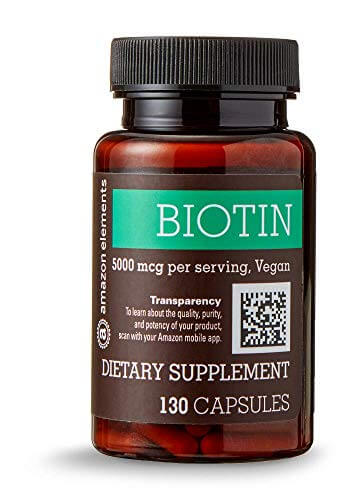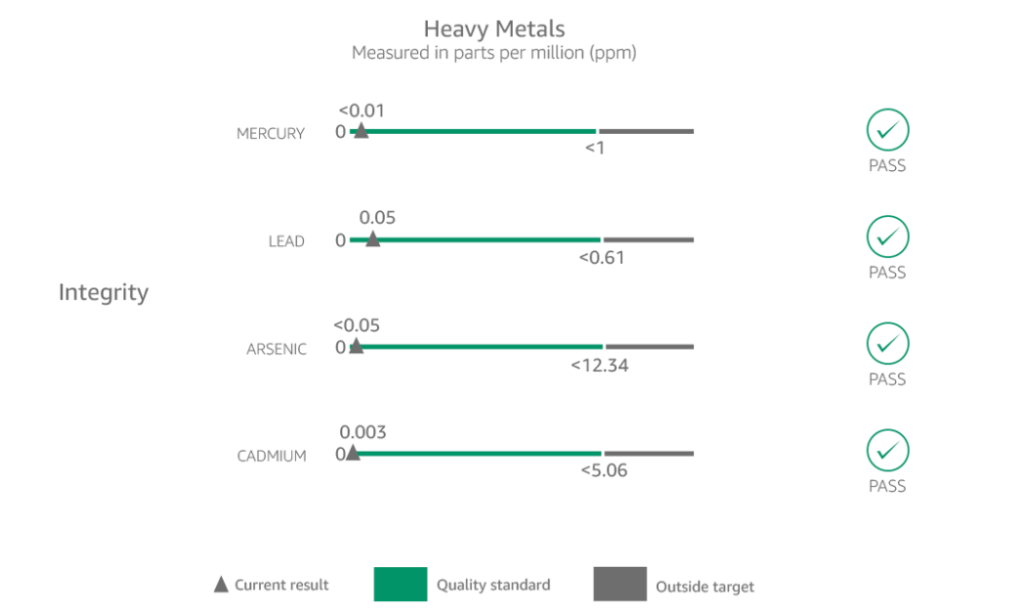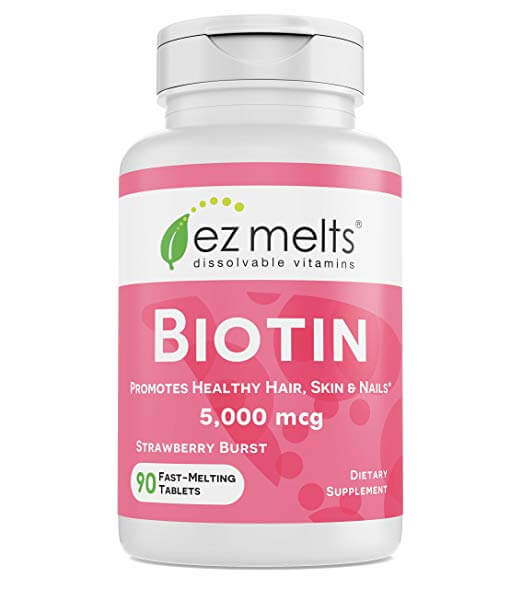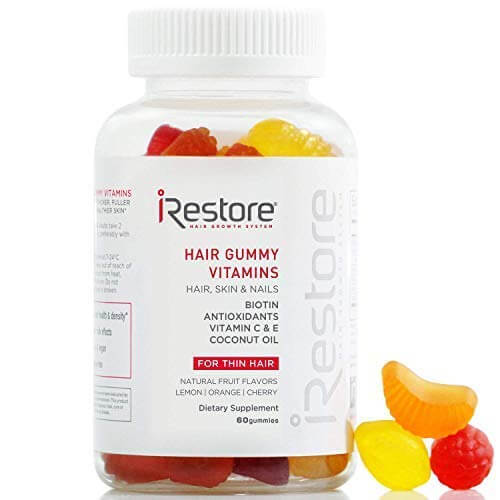A Brief Refresher on Biotin (Vitamin B7):
- Biotin is found in meat, fish, dairy, eggs, as well as nuts and seeds. Here are the best vegan food sources of biotin.
- Biotin is needed by the body to utilize fats, carbohydrates, and amino acids.
- Deficiencies in biotin can lead to hair loss (most common), rashes, and heart problems.
Most people get interested in eating more biotin or taking biotin supplements because they notice their hair thinning.
A lack of biotin may be the cause of hair loss, although there are other possible causes.
Many people who take a biotin supplement after experiencing hair loss experience a significant increase in their hair growth. Some people do not, which means something else is probably causing the issue.
Table of Contents
Is All Biotin Vegan?
When it comes to food sources of biotin, it’s most easily found in animal products.
For plants, nuts and seeds are by far the best sources of it (and mushrooms for some reason).
When you see “biotin” on an ingredients label, it’s possible that it came from an animal source, but it’s usually synthetic – vegan.
Like most vitamins, it’s just cheaper to produce it in a lab most of the time when you need to scale to large volumes, instead of extracting it from animals.
How Much Biotin Do You Need?
Since biotin is a water soluble vitamin, your body can’t store it in large amounts. This means you need to consume biotin (from food or supplements) on a regular basis.
There’s no RDA (Recommended Dietary Allowance) for biotin, but medical professionals usually recommend 30 to 100 micrograms per day.
Supplements usually have well over 1,000 micrograms (mcg) in each serving, which is way more than enough. The excess won’t be absorbed, it’ll be excreted in your urine.
While food is the ideal option to get more biotin, my goal here was to find the best vegan biotin supplements.
What To Look For in a Vegan Biotin Supplement
For a supplement to qualify to be on this list, it had to meet the following criteria:
- Clearly 100% “vegan” – Some were labeled “vegetarian,” and it wasn’t clear if the biotin may have come from dairy. Many supplement companies that make some vegan products might not make vegan biotin (e.g. Sports Research, Pure Naturals, Nature’s Bounty)
- Limited sugar or other filler ingredients.
- From a reputable manufacturer.
Let’s look at what I came up with.
The 3 Best Vegan Biotin Supplements
All 3 of these biotin supplements are good options, meaning that they’ll be effective if you’re truly biotin deficient.
Biotin is biotin, so it’s not like one brand is better than another based on the biotin, as long as they’re all using biotin that is high purity. That’s why I looked for reputable brands on my search.
The main differences between these are price per serving and type of supplement.
The best option for you will depend on your budget and whether you prefer a pill, capsule, or gummy.
Ultimately, they’re all good biotin supplements, so there’s no need to stress about your decision too much.
Here’s a summary table to help compare them, I’ve gone into more detail below.
| Name | Price/capsule | Type | Dosage (mg) | Rating |
|---|---|---|---|---|
| Amazon Elements | $ | Capsules | 5,000 | 4.8 |
| EZ Melts | $$ | Melting tablets | 5,000 | 4.5 |
| iRestore Gummies | $$$ | Gummies | 5,000 | 4.1 |
Now let’s look at each individual supplement that I rated highly.
1. Amazon Elements Biotin

This supplement is “Amazon’s brand.”
It’s made by Arizona Nutritional Supplements (ANS), with Amazon’s stamp of approval on it.
Not suprisingly, it’s the cheapest option by far.
This is a pure biotin supplement, no other ingredients included except for the ones in the capsules.
Each capsule is very small, about the diameter of a dime (or size of a tic-tac).
The best part of this supplement is the transparency.
They reveal where each ingredient is from, as well as test results.
While it’s all put together in Arizona, the individual ingredients come from all over:
- The biotin comes from China (created using a lab reaction)
- The cellulose comes from Brazil
- The vegetable capsule and silicone dioxide sourced from US
Don’t be put off by the fact that the biotin is sourced from China, almost all biotin does. About 90% of biotin that’s imported into the U.S. is from China.
More importantly, the test results are published:

Most people are wary of supplements from China because of heavy metal concerns, but the test results clearly show that there’s no contamination.
When Amazon puts their brand on something, they almost always work with highly reputable suppliers, which gives me some confidence in the product at least.
2. EZ Melts Biotin

EZ Melts is one of the most popular vegan supplement brands.
They’re most known for their “EZ melt” technology, which essentially means that their supplement pills dissolve super quickly so the active ingredients can be absorbed by the body easier.
This biotin supplement is made in the U.S., and has a natural strawberry flavor. It’s sweetened with stevia and fruit extract, but there’s no sugar or callories.
It’s certified vegan, gluten-free, and non-GMO.
3. iRestore Biotin Gummies

If you prefer gummy supplements to pills, iRestore is one of the few vegan options. It’s the best vegan gummy biotin supplement I could find.
On top of biotin, it also has:
- Vitamin E and C
- Coconut oil
- Turmeric
As with most gummies, it comes with other ingredients.
Here’s the full ingredient list:
Glucose syrup, sucrose, water, pectin, citric acid, natural flavors (lemon, orange, cherry), black carrot juice concentrate, turmeric, fractionated coconut oil
Most of these are for flavoring and texture.
A bottle comes with 3 flavors: orange, lemon, and cherry.
The big downside is that this is the most expensive option, and you’re recommended to take 2 per day (compared to 1 of the others).
They’re still not crazy expensive, but if budget is a primary concern, go with one of the other options.
Hopefully this list of the best vegan biotin supplements helps you find the best one for you.
If you have any questions, just leave them below!
